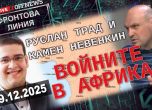

Svetlana gives me a big hug and says, "We're in your hands now!" She bursts into tears. Then she suddenly draws back - we need to hurry. We load the four children into the car. They are freezing. They have been waiting for me in the cold for more than two hours. Not that there's no place to go to get warm. They are afraid of missing me.
We are in Chernivtsi, a Ukrainian city lying 30 km away from the Romanian border.
They had got up in the middle of the night to leave Lviv at 6 am, when the curfew ended. The journey from Lvov is six and a half hours. On the way, a rocket fell a few hundred meters away from them. The next day and a half, on the road, the children and I would talk mostly about rockets and bombs.
They say a quick goodbye to the father Yuri - a famous biathlete I've watched on TV. Yuri gets into the car he's brought them in and drives off. He goes back to the front.
We, journalists, are cynical, and I am especially so. We have covered many wars. We have many times been in a situatuin to pick up pictures of death and destruction. The more violent, the better, we'll impress the reader. Even with this war, we've become accustomed to it, and we now see casualties as numbers, not fates.
This picture I just couldn't get used to. Men leaving their wives and children. They turn the car around and head for the front. And the women, good-looking, elegant and beautiful young women who had everything until yesterday, get off with a backpack and three, four, five children, with the cat in a cage and the dog on a leash, and go off alone into the unknown.

Four hours on the border between Romania and Ukraine watching this. Hundreds of women and children pass by. Only two men, many elderly people. Some pushing their elderly mother in a wheelchair.

A girl, seems to me less than 30, walks by with a very small backpack. She's got the two older kids by the hand, the third, who's barely 3, is held by a strap tied across his chest.
The queue isn't big, but it's slow going. Each of the vans entering Ukraine is full of humanitarian aid. They will unload in Chernivtsi, and from there they will pick up mothers with children.
Hundreds of people from Bulgaria, Romania, Greece and Turkey have been doing this since the war began. They've driven as much as halfway across the equator, figuratively speaking. Some have their own vans, others have rented them. They come home for a night, sleep over and return to Ukraine.
We, Ukraine's neighbours, cannot stop the war. We can only save lives. Currently, Chernivtsi is the only secure border crossing through which refugees can be evacuated.
Poland, which has taken in more than 2 million Ukrainians since the war began, is now almost inaccessible. The border is not closed, but the Russians are constantly bombing the areas around it. Only Chernivtsi is quiet.
Chernivtsi in Ukrainian (or Chernovtsi in Russian) is a wonderful city. It is as big as Plovdiv and is the capital of the Bukovina region. Romanians consider Bukovina theirs, Ukrainians - theirs, but for most of its past it was in the Austro-Hungarian empire. It feels much more like Austria than the Soviet Union. There are several villages from the border to the town. Strikingly clean and tidy with nice, well kept houses.
I tell Svetlana how surprised I am that Ukraine is so rich and beautiful.
- You see what we can lose. I have been to Russia, to the villages around Saratov. And I can tell you that they do not look like ours.
We easily find the address where we have to take the aid. There are about thirty strong men waiting outside. The Ukrainians are shockingly large. In Chernivtsi the war has not yet come and the men are wondering how they can be of the most use. That is why they are constantly crowding around the unloading point, and new and new aid vans and trucks stop there every minute.
However, we are greeted with unprecedented interest. "Bulgaria is with us, Bulgaria is with us!". Passers-by gather. They hug us, thank us.

Before unloading, there is a special ritual. Each van is filmed on camera, it is announced where it comes from, who collected the aid, how many boxes there are and for whom they are intended.
Our aid comes from the Bulgarian municipality of Tervel. They were collected by the local people there. Medicines, clothes, blankets. Yavor (I never found out his surname) brought them in the municipality's van to a parking lot in Ruse, where we loaded them onto my jeep.
I don't even remember if I have been to Tervel. But when Semyon (the person in charge of distribution) announces that this is the aid from the Bulgarian municipality of Tervel to the Ukrainian city of Alexandria, Tervel sounds so proud that I look like I have lived there all my life. "Tervel, Tervel!" the huge men chant and hug me.
We have no time to enjoy the welcome. We have to cross the border in daylight.
The children in my car are 4, 8, 9 and 10 years old. Svetlana is 47 years old. Mother of one, aunt of the second and grandmother of the other two. Svetlana's sister and her eldest daughter are soldiers. One has been at the front since the first day of the war. The other is in the barracks, waiting to be sent somewhere at any moment. On the way we watch videos they have sent to the children. Shockingly beautiful women with rifles and military uniforms.
The whole family is from a small military town west of Lviv, close to the Polish border. There are military sites in the town and the Russians bomb it all the time. The sirens go off between 6 and 10 times a day. Since 25th February the children have hardly slept. They are constantly in the bomb shelters. Several times they tried to get out, but the sirens immediately turned on.
I tell them to take off their jackets, it's warm in the car.
- Now they'll start bombing us, and it's cold in the shelter," Veronica answers me. I start crying. Veronica, a fascist at 4, talking in a baby language. And she has to be de-Nazified with bombs.
At the border we wait a long time. Both the Ukrainians and the Romanians thoroughly check out this mother with four children, talk to them to make sure they weren't taken by force, take pictures and translate documents. In the meantime they offer the children stuffed toys, ask them if they are hungry, if they are well.
It's much more interesting after the barrier, though.

The Romanian-Ukrainian border is something that really needs to be seen. Amidst the horror of war, it is a kind of a triumph of solidarity and humanity. There are hundreds of volunteers. Most, of course, are from Romania, but there are Greeks, Turks, too.

Dozens of tents have been set up - a medical station, rest areas, food kiosks handing out free hot food, chocolates and chips. Clowns entertain the kids and give them more stuffed toys, we cram the jeep with stuffed toys. They put free sim cards into your hands, ask if you're hungry, if you want sandwiches for the road, if you need to sleep a bit, do the kids miss anything, do they have warm clothes. And they applaud you for driving a car full of children, because there are still hundreds of women and children waiting at the border for someone to pick them up.

Soon it gets dark and we decide it's better to stay the night at a hotel than to drive with with kids. We find a lovely hotel with a very nice and warm apartment for Svetla and the kids. Honestly - I never imagined that a bed could bring such joy to a child. Bed. For the first time since February 25. Warm. An ordinary warm bed, the kind they hadn't slept in for 25 days. Veronica asks, just in case, "Are they going to bomb us here?" And immediately falls asleep.
Some quick facts
The distance from Sofia to Chernivtsi is 920 km. We were told it takes 22 hours, but that's with a lot of waiting at the borders. We got from Sofia to Bukau - 200 km before the Ukrainian border in 10 hours with breaks. The whole route the road was fine, not counting the Bucharest ring road which was horrible.
There were no queues at the Bulgarian border but we were held up quite a bit. It's understandable - we were driving with four kids and the policemen were doing their job because there are cases of traffic and everyone should be checked and questioned.
And thanks
I was on this adventure with Yuli. He is the only person who always comes with me when others are afraid. And to be honest - it wasn't scary. Anyone can do it, they just need a Yuli to go with.
The biggest thanks goes to Desi and Emo who provided their home at the center of Sofia for Sveta and her children. They are already saved. They are warm and safe and need nothing.
And the best story I won't tell. It was a heartwarming conversation between Oleg (9) and Veronica (4) for me. It will remain their secret.
------------
Translation Stefan Iontchev










































Моля, регистрирайте се от TУК!
Ако вече имате регистрация, натиснете ТУК!
Няма коментари към тази новина !
Pornhub разкри руската братушка: Гледат основно трансджендър порно
Насилник крещял на жена си, докато я пребива: Аз казах ли ти, че ако ме излъжеш, ще те убия
''Зелено движение'' предлага намаляване на възрастта за гласуване от 18 на 16 години
''Зелено движение'' предлага намаляване на възрастта за гласуване от 18 на 16 години